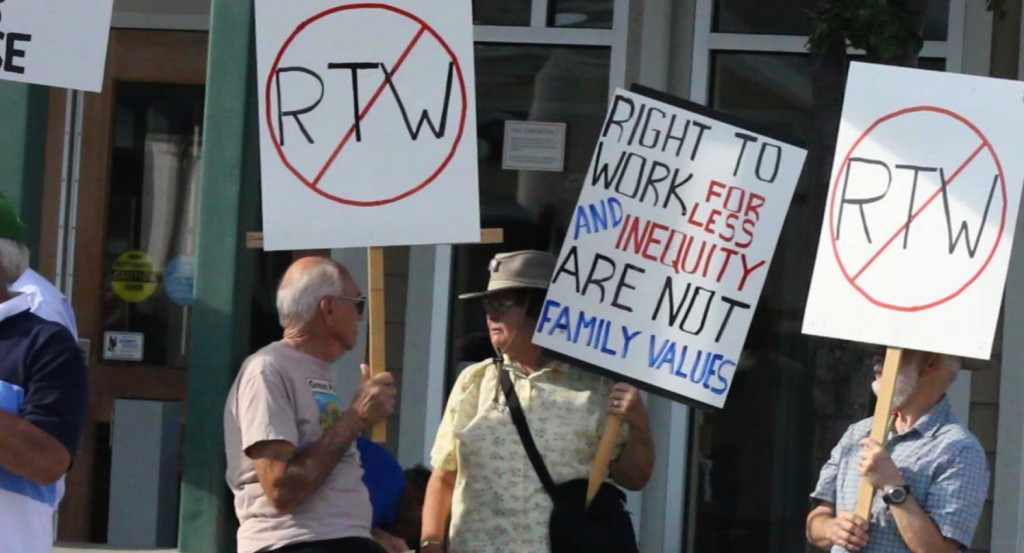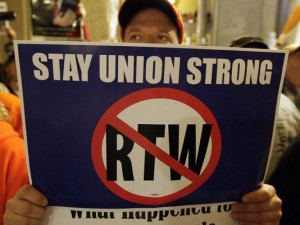
New tact’s ultimate goal: get to ‘corporate-friendly’ Supreme Court
By ED FINKELSTEIN
Publisher
Like a deadly disease mutating into an even deadlier form, right-to-work has mutated in a new, more sinister direction.
Quietly, the American City County Exchange (ACCE) –– an initiative of the arch-conservative American Legislative Exchange Council (ALEC) –– has begun working to pass right-to-work laws at the city and county level.
Or at least that appears to be its public goal.
A review by the Labor Tribune of the group’s initial efforts clearly indicates a new right-wing strategy, one where RTW backers, whether they win or lose at the local level, expect legal challenges from the losing side that will ultimately get the issue before the U.S. Supreme Court.
The legal challenges, funded by the National Right To Work Foundation or the ultra-conservative Heritage Foundation, will wind up before what one reporter called “the corporate-friendly U.S. Supreme Court.”
Until now, ALEC has contented itself with providing template anti-union legislation for captive state lawmakers to submit as their own to try to cripple workers’ rights and collective power at the state level. Missouri is one of the states where ALEC has been extremely active. The failed RTW bill in this year’s legislative session was one of ALEC’s cookie-cutter bills.
LOCAL COMMUNITIES EASY PICKINGS
The new approach bypasses statewide efforts –– usually expensive and time consuming –– in favor of enacting boilerplate bills in local cities, towns, villages and counties where the effort is far less expensive and the influence of radical right-wing corporations and politicians is easier to exert.
At the local level, ACCE has two routes to travel: a local initiative petition, if it’s allowed by state law, or passing a local ordinance through the city council.
Currently, legal experts say such efforts are illegal. The common understanding is that federal law, under the 1947 Taft-Hartley Act, allows only states to enact RTW laws.
That has not deterred the ACCE. Heritage Foundation legal scholar Andrew Kloster, speaking at a recent Heritage Foundation forum, said the issue is simply not mentioned in Taft-Hartley, leading most to assume that Congress meant for only states to have that right.
And whether it’s legal may not matter. Win or lose at the local level, ACCE’s strategy is to prompt litigation –– at great expense to city and county councils –– with the ultimate goal of getting the issue to the U.S. Supreme Court.
INITIAL TARGETS REJECT EFFORT
 ACCE is currently focusing its efforts on three cities in Washington State. However, Ohio, Kentucky, Pennsylvania and New Mexico have been announced as targets as well. All are worker-friendly states that do not have an anti-worker, anti-union RTW law.
ACCE is currently focusing its efforts on three cities in Washington State. However, Ohio, Kentucky, Pennsylvania and New Mexico have been announced as targets as well. All are worker-friendly states that do not have an anti-worker, anti-union RTW law.
Just last week, city councils in two of the three targeted Washington State cities — Sequim and Shelton — unanimously rejected bills to ban union security clauses in their employees’ union contracts.
It only took a few hundred signatures to get the measures before the city councils.
But the law was considered so onerous that even the lone Right Wing member of the Sequim council voted to kill the measures.
During the public debate on the Sequim issues, one conservative right-wing speaker branded opponents of the anti-union measures as “communist sympathizers” and slammed “unemployment checks” as “nothing more than taking from one group and giving to another.”
BARGAINING IN PUBLIC
In the third city, Chelan, the local chamber of commerce is supporting an initiative petition drive. Here, under the guise of “transparency,” the proposed ordinance not only impacts city employees’ contracts, but seeks to force collective bargaining sessions to be open to the public.
City attorneys in Sequim and Shelton concluded that the effort was illegal. Additionally, the Sequim city attorney said the propositions “…attempt to do indirectly what they cannot do directly; collectively bargain through initiative. They put …taxpayers in jeopardy of paying for potential unfair labor practices.”
Reporter David Groves of the Washington State Stand said, “The city-by-city campaign against unions mirrors the new strategy of ALEC . . . to attack unions at the city and local level.”
‘EXPERIMENT’ WITH TAXPAYERS’ MONEY
Groves goes on to note: “The conservative Heritage Foundation just released a report urging that localities should “experiment” with local right-to-work ordinances in an attempt to set up legal challenges that could go all the way to the corporate-friendly U.S. Supreme Court.
TAKING THAT ADVICE
It seems too that other Republican-controlled municipalities are already heeding the Heritage Foundation’s urging:
• In Fort Wayne, Indiana, the city council’s Republican supermajority pushed through a series of bills—including its very own local right-to-work law—that make it far more difficult for unions to represent government employees.
• In Illinois, Bruce Rauner, Republican candidate for governor, cites the creation of local right-to-work zones as one of his top policy priorities.
• In Pennsylvania earlier this year, the statewide association of county commissioners encouraged officials across the state to pass their own county-level laws restricting unions’ ability to collect mandatory dues.
‘DID AWAY WITH UNIONS’
Fort Wayne’s anti-worker efforts have taken an even crazier approach.
In June, the city council approved a law that effectively eliminates the right of many municipal employee unions to play any role in bargaining, rendering most of the unions powerless.
This did not apply to public-safety workers, however, who became the subject of a different law, passed in July, that imposes a more straightforward right-to-work ordinance on police and firefighters.
“Now, we don’t even have a seat at the table,” says Lloyd Osborne, business representative of the Operating Engineers Local 399 that represents street maintenance and water utility workers. “We can’t go on (workplace) property to represent or even speak to our members—or who used to be our members. They completely did away with the unions here under a local ordinance.”
NO LEGAL PRECEDENT
“Legal costs for the cities targeted by the Freedom Founding are already beginning to mount and could go much higher,” Groves notes
In an article in the Washington Examiner, ACCE director Jon Russell, while conceding there is little legal evidence supporting the group’s argument that cities and counties can pass such laws, notes that there is virtually no case law on the subject.
Thus ALEC’s/ACCE’s “get it up to the U.S. Supreme Court” strategy begins to take shape.
DIMINISH LOCAL GOVERNMENTS
The Washington State Labor Council reports:
“At ALEC’s 2014 spring meeting, Utah Senator Howard Stephenson (R-Salt Lake City) called for diminishing local control of politics. He said, ‘School boards and city councils take away liberties quicker than the federal government. Local governing entities can be a roadblock to the ALEC agenda, so their power needs to be preempted and removed.’”
The Council notes the Freedom Foundation, an Olympia, WA-based conservative organization with close ties to ALEC, “uses words like ‘transparency’ and ‘choice,’ but they hide the fact that they are funded by out of state billionaires and their agenda is straight out of the corporate playbook. They could not pass these ideas on a statewide level, so they are trying to destroy workers’ rights on a city-by-city level.”

